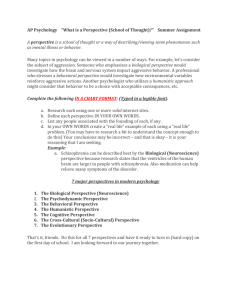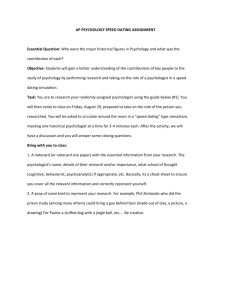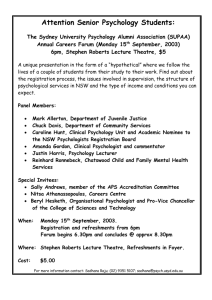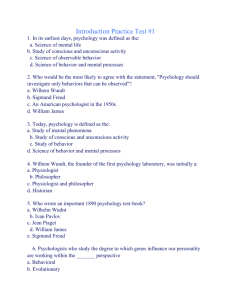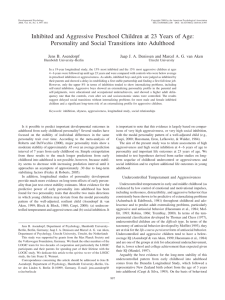Introduction - UWSP Home Page
advertisement
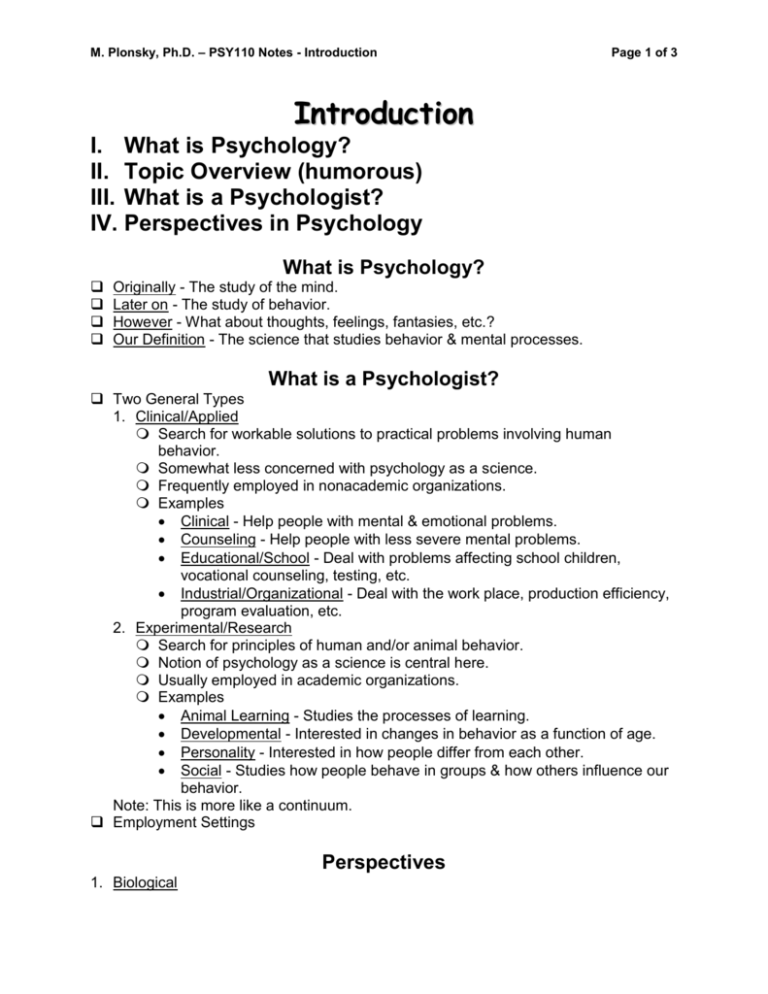
M. Plonsky, Ph.D. – PSY110 Notes - Introduction Page 1 of 3 Introduction I. What is Psychology? II. Topic Overview (humorous) III. What is a Psychologist? IV. Perspectives in Psychology What is Psychology? Originally - The study of the mind. Later on - The study of behavior. However - What about thoughts, feelings, fantasies, etc.? Our Definition - The science that studies behavior & mental processes. What is a Psychologist? Two General Types 1. Clinical/Applied Search for workable solutions to practical problems involving human behavior. Somewhat less concerned with psychology as a science. Frequently employed in nonacademic organizations. Examples Clinical - Help people with mental & emotional problems. Counseling - Help people with less severe mental problems. Educational/School - Deal with problems affecting school children, vocational counseling, testing, etc. Industrial/Organizational - Deal with the work place, production efficiency, program evaluation, etc. 2. Experimental/Research Search for principles of human and/or animal behavior. Notion of psychology as a science is central here. Usually employed in academic organizations. Examples Animal Learning - Studies the processes of learning. Developmental - Interested in changes in behavior as a function of age. Personality - Interested in how people differ from each other. Social - Studies how people behave in groups & how others influence our behavior. Note: This is more like a continuum. Employment Settings Perspectives 1. Biological M. Plonsky, Ph.D. – PSY110 Notes - Introduction 2. 3. 4. 5. 6. 7. Page 2 of 3 Seeks to determine the biological processes that underlie behavior & mental events. Several types of analysis are used here, including: Evolutionary (which forms a closely related perspective) N.S. structure & chemistry (the brain & its connections) Genetic Hormonal Evolutionary (closely related to biological) Basic principle is that our current behavior exists in its present form because it provided some advantage in survival & reproduction to our ancestors. Behavioral (not listed in CF13) One founder was John B. Watson (1878-1958). Thought of a baby as a tabula rasa or blank slate. Watson 1913 Quote - Give me a dozen healthy infants, well-formed, and my own special world to bring them up in and I'll guarantee to take any one at random and train him to become any type of specialist I might select - doctor, lawyer, artist, merchantchief, and yes, beggarman and thief. Another famous behaviorist was B.F. Skinner (1904-1990). 1971 quote: Behavior is shaped and maintained by its consequences. Stresses the observation & measurement of behavior. Is sometimes called the “Stimulus-Response (S-R) view” or “black box view”. Stimulus - an event in the environment. Can be simple or complex. Give exs. Response - behavior. Stimuli Black Box Responses Cognitive One famous Cognitive Psychologist was Ulric Neisser. 1976 quote: Cognition is the activity of knowing: the acquisition, organization, and use of knowledge. Views what's occurring inside the black box as what is most important. To use a computer analogy, this view studies the software of the mind. Stresses the importance of mental processes (e.g., perception, memory, thought, problem solving, & language usage). Social Emphasizes the role of other people in influencing our behavior & cognition. Looks at the behavior of more than one person at a time. Developmental Looks at behavior in terms of how it changes over the life span. Clinical Seeks to explain, define, & treat abnormal behaviors. It is actually a collection of perspectives dealing with mental illness. For ex., Clinical Neurology specifically deals with disorders of the NS (e.g., brain damage) that cause the illness. a. Psychoanalytic Founded by Sigmund Freud (1856-1939). Was based on his experiences with mentally disturbed patients. Freud 1927 Quote - Every individual is virtually an enemy of civilization. . . . There are present in all men, destructive, and therefore antisocial and anticultural M. Plonsky, Ph.D. – PSY110 Notes - Introduction Page 3 of 3 trends. . . . For the masses are lazy and unintelligent . . . and the individuals composing them support one another in giving free rein to their indiscipline. Believes that much of our behavior & feelings are determined by unconscious processes (stuff going on in our minds that we are unaware of). Drew an analogy of the mind to an iceberg. Believed our behavior is determined by sexual & aggressive instincts (inborn tendencies to behave in a certain way). b. Humanistic One famous humanist was Carl Rogers (1902-1987). Emphasizes the individual's phenomenology (subjective or personal view of the world.), as well as a process called self-actualization. Rogers 1977 Quote - There is in every organism, at whatever level, an underlying flow of movement, toward constructive fulfillment of its inherent possibilities. There is a natural tendency toward complete fulfillment in man. 8. Individual differences/personality Rather than being interested in the average, this perspective is more interested in the variability people show. It is interested in diversity of behavior. Comparison Are simply different ways of looking at behavior. Although they do not always agree, they compliment one another. Consider how each perspective would answer the question: “Why is a Person Aggressive?” 1. Biological - Physiological structure/function is abnormal. 2. Evolutionary - Aggressive people were more likely to survive & reproduce. 3. Behavioral - Person was rewarded for being aggressive. 4. Cognitive - The way we think about the events preceding the aggression (ex. intention vs. accident). 5. Social - Were influenced by others. 6. Developmental - People most likely to be incarcerated are young adult males. 7. Clinical - The aggression could be a symptom of illness. Psychoanalytic - We are born with an aggressive instinct. Humanistic - Frustration of self-actualizing tendency. 8. Individual Differences/Personality - People differ in aggressiveness over a wide range. Aggressiveness/assertiveness can be a trait.


